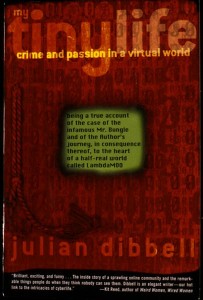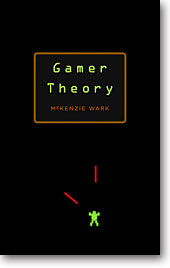Oct
13
2009

We are very excited to announce that we will be joined for our Book Club episode by Mr. Julian Dibbell, author of My Tiny Life, one of the first works to explore the social dynamics of online worlds, game-oriented and otherwise. We will discuss the book as well as current topics of Mr. Dibbell’s interest (which may or may not include discussion of his book Play Money, Chinese gold farming, Scientology, or any number of other subjects).
If you have questions about My Tiny Life post them in the comments here or send them to @firstwallrebate on Twitter. We will address as many interesting questions as we can during the podcast. Get your questions posted or sent by October 20. We’ll record on that day and get it posted as soon as possible afterward.
My Tiny Life is available from LuLu.com as a purchase or free-to-download PDF. If you would like to get the paper experience without all the paper, then you could check out the Google Book Search version.
no comments | tags: book, Julian Dibbell, My Tiny Life | posted in announcements, book club
Jun
2
2009

In 1998 Julian Dibbell published My Tiny Life and altered the way we would think and write about videogames. His investigation into online worlds defined a new type of virtual ethnography, and has spawned volumes of discussion and debate. But beyond creating fodder for digital culture and game studies classrooms of the future, Dibbell’s book remains one of the most entertaining reads one can find. He covers the nerdy, the perverse, and the heartwrenching, and profoundly reminds us how much the imaginary stuff matters.
My Tiny Life is the story of Dibbell’s experiences as he tries to live his life in and around the virtual realities of early text-based Multi-User Dungeons (MUDs) and the people who made those spaces. These are not exactly games, although games take place within them. And they are not simulations, although simulations have been built inside them. These worlds are an in-between, existing both as corporate experiments and grassroots underground. Dibbell’s strength is how he binds together these and many more dichotomies, creating work that is both analytical and emotive, existing somewhere between anthropological study and personal memoir.
In 2008 Dibbell managed to do what most writers only dream of: He wrestled his book from the hands of his original publisher (who had let it go out of print) and gave his book to the masses by releasing it free (with a few caveats). This is fortunate for us because My Tiny Life is available in a variety of ways. Of course, there is a lot to be said for the dead-tree version, and Dibbell offers that medium via LuLu.com. Also available via LuLu is a free-to-download PDF version. If you would like to get the paper experience without all the paper, then you could check out the Google Book Search version.
We invite you to join us in reading, or re-reading, Julian Dibbell’s My Tiny Life over the next several weeks.
no comments | tags: book, Julian Dibbell, MOO, MUD | posted in book club
Apr
18
2009
 In our second Book Club episode we are delighted to be joined by McKenzie Wark to discuss his networked book Gamer Theory. In our conversation we explore the book’s genesis as an outcropping of Wark’s influential 2004 offering A Hacker Manifesto; its unique gestation as an online text at the Future of the Book; the connections between reading + play and writing + design; and how agon is at the center of the banking crisis and resultant New Depression economy. We also manage to work in a few of the questions you sent us, so make sure to listen carefully for your glorious No-Prize when we call your name.
In our second Book Club episode we are delighted to be joined by McKenzie Wark to discuss his networked book Gamer Theory. In our conversation we explore the book’s genesis as an outcropping of Wark’s influential 2004 offering A Hacker Manifesto; its unique gestation as an online text at the Future of the Book; the connections between reading + play and writing + design; and how agon is at the center of the banking crisis and resultant New Depression economy. We also manage to work in a few of the questions you sent us, so make sure to listen carefully for your glorious No-Prize when we call your name.
We’d like to thank all of you who read along with us, and especially those of you who contributed comments and questions. We’ll be announcing a new selection for the club within the next few weeks, and look forward to having you join us again.
1 comment | posted in book club, podcasts
Apr
3
2009
We’ll be recording our second Book Club episode next week for Gamer Theory, and we’re pleased as punch to announce that the book’s author McKenzie Wark will be joining us for the discussion.


If you’d like to participate in the conversation, you can post comments or questions to our Book Club page, Facebook group, or direct message us on Twitter. We’ll be recording the episode on Thursday, April 9.
no comments | tags: academia, gamer theory, mckenzie wark, videogames | posted in announcements, book club
Sep
5
2008
Our first FWR Book Club episode is now complete. As some of you already know, the selection for this episode was Digital Culture, Play, and Identity: A World of Warcraft Reader, edited by Hilde G. Corneliussen and Jill Walker Rettberg. This episode is composed of responses that we collected from friends and listeners both here at the site and in our Facebook group. Many thanks to those of you who took time to write in.
Our next Book Club selection is Gamer Theory by McKenzie Wark, available for reading both online and in the traditional dead-tree format.
no comments | posted in book club, podcasts
Aug
7
2008
Shane and I will be recording the Book Club episode of FWR within the next week or so and would be delighted to have you participate. If you’ve already picked up a copy of Corneliussen & Walker-Rettberg’s book Digital Culture, Play, and Identity: A World of Warcraft reader, please post your thoughts here on our blog or in our Facebook forum and we’ll incorporate them into the show. If you haven’t read the book but would still be willing to share your WoW thoughts/observances/experiences, we’d love to have you chime in as well.
More than anything, we are way more interested in facilitating a conversation about WoW and issues raised in the book than “reviewing” or critiquing. If you are even passingly interested in World of Warcraft, we want to hear from you.
Cheers!
no comments | tags: books, games, MMORPGs, pc, podcasts, video games, videogames, world of warcraft, WoW | posted in announcements, book club



